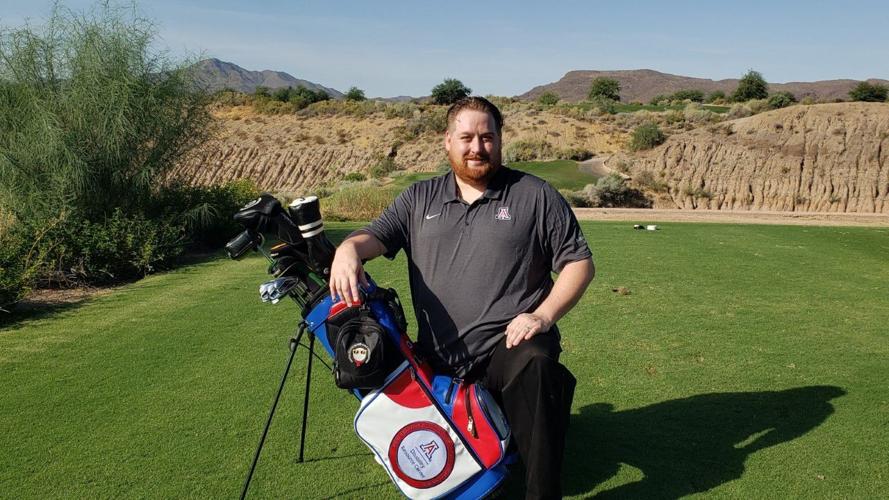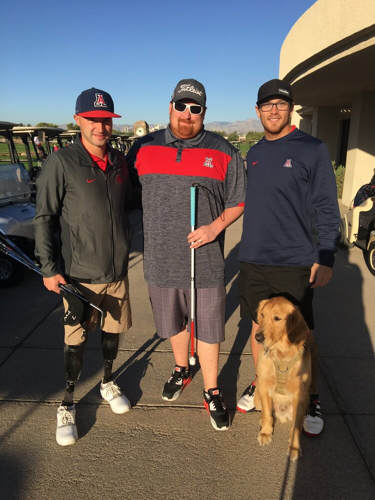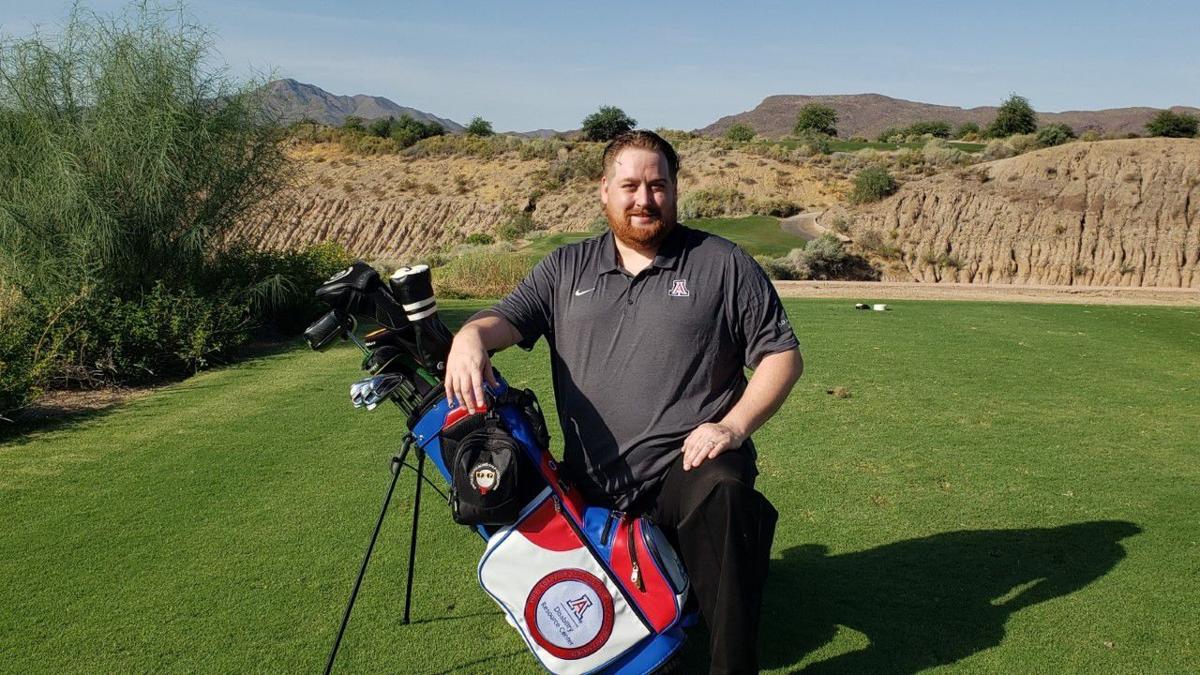Dozens of the world’s top-ranked adaptive golfers will hit the links in Tucson later this month, marking the start of the 2021 adaptive tournament season.
The first-ever Conquistador Paragolf Championship tees off April 20 at Casino del Sol’s Sewailo Golf Club. Top-ranked adaptive golfers will join members of the University of Arizona’s adaptive golf team in the tournament, with proceeds benefiting the UA team and other adaptive golf initiatives in Southern Arizona.
The tournament is the second of two events hosted by UA’s Adaptive Golf Program, with the TeeItUp Spring Shootout taking place Monday. The 18-hole scramble is an amateur shotgun event taking place at the Omni Tucson National Resort, said Jon Moore, managing director of TeeItUp Enterprises. No spectators will be allowed.
The public is welcome to watch at Sewailo, however. Fifty of the world’s top 200 adaptive golfers will be participating in the Conquistador.
“We’re going to have outstanding golfers playing in this event,” said Moore, adding that he hopes the event exposes junior golfers to the game and helps get more people interested in golf. “We’re extremely excited. This is going to be a major in adaptive golf.”
The event helps put Tucson and Southern Arizona on the map as the epicenter for adaptive golf, Moore said.
“We want for when people say ‘adaptive golf,’ they think of Tucson first,” he said.
Moore, who is also director of the UA’s adaptive golf program, got involved with TeeItUp several years ago when his son, Christopher Schmidt, lost his vision following brain surgery on a tumor that had wrapped around his left optic nerve.
Schmidt, legally blind, “sucked it up and practiced, and dedicated his life to playing golf as an adaptive,” Moore said.
Schmidt went on to become the back-to-back United States Blind Golf Association national low net champion in both 2018 and 2019.
While Moore’s work with TeeItUp isn’t a job that pays the bills, he says he’s found it to be very gratifying — especially during the trying times of the past year.
“Golf is the perfect foible for all that, given these times,” Moore said. “It’s outdoors, it’s naturally socially distanced. We have put all the safety protocols in place that we can, and we’ve been following very closely the UA guidelines.”
Capacity and travel limitations mean 72 players will participate in this year’s Conquistador championship. Moore hopes next year’s tournament will have a full field of 144 players.
Until then, he’ll make do with adaptive golf greats like Billy Fryar, the No. 1-seeded golfer in the world, and Jonathan Snyder, a North American One-Armed Golf Association champion.
After spending another winter in Westmont, Illinois, 39-year-old Snyder said he’s looking forward to some sunshine.
“This year has definitely been a change,” Snyder said.
A golf instructor who gives lessons through the U.S. Adaptive Golf Alliance, Snyder said that the group was able to continue their clinics during the pandemic, they just had to switch up the locations. Instead of teaching in schools, they moved their lessons to golf courses and driving ranges.
“Golf and adaptive golf has seen a lot of positive effects from this,” Snyder said. “You can play outdoors while following most every state guideline that’s out there.”
The alliance was able to hold five adaptive tournaments in 2020, down from 20 to 30. This year’s season is off to a late start, as it usually starts in January, but Snyder said this is a case of better late than never.
“I’m very excited about getting back to golf and getting to visit the great state of Arizona,” Snyder said. “I’m looking forward to getting back to a little bit of normalcy and getting to enjoy the camaraderie.”
Snyder, who was born with a below-the-elbow deficiency, plays without a prosthetic. He’s been a golf pro for about a decade.
Synder discovered his passion for the game as a 12-year-old, after he began playing with his grandfather. He didn’t begin playing full-time until he was in his 20s, but has since made the sport his life, working his way up at a golf club from the cart barn to general manager.
“I learned the whole process of the golf industry,” Snyder said.

From left, Jesse Williamson, Chris Schmidt and Danny Acosta are members of the UA adaptive golf team.
It almost didn’t turn out this way.
Snyder, whose first love was basketball, was ready to leave for college when his father had an accident that led to the loss of several fingers on his left hand. Snyder stayed home to help his dad run his company, and the experience brought them closer together.
“He’d ask me questions about how to tie shoes or button buttons with one hand,” Snyder said, adding that the experience also helped deepen his faith.
Snyder said he loves the therapeutic benefits of adaptive golf and the genuine care that each player has for his or her fellow competitor.
“You definitely have to be sharp out there and you have to think your way around the golf course,” Snyder said. “Every single round, every single shot is a challenge. It’s a great sport for anyone to play to overcome any challenge they may have.”
Wheelchair golfer Fryar is also looking forward to kicking off the 2021 season, his fourth year playing adaptive golf.
Fryar only competed in one event his first year, and has increased his participation every year since. Last year, he played in five events, albeit under different circumstances than in his first three years with the sport.
“I spent a lot of time on the road. I drove more than 8,000 miles,” Fryar, 48, said from his home in Bigelow, Arkansas. “I wanted to play. I wanted to golf and see my friends.”
While his game’s a “little rusty coming out of winter,” Fryar is looking forward to hitting the links and getting back to the game he loves.
“It’s such a challenging game,” Fryar said. “You can’t win the game, you can just play the game. People base success on different things.”
Fryar said in his mind, golf is a game in which he’s competing against himself. It was that way even before he started using a wheelchair 20 years ago.
Four years ago, Fryar attended his first tournament in Orlando, hoping to meet people and see how other people with disabilities were able to make golf work for them.
“It was very cool to network and see other people and how they adapted,” Fryar said. “I was hooked from there.”
While Fryar hopes to up his tournament number in 2021, he says 2020 wasn’t a “complete loss.”
Fryar earned himself a spot on the U.S. paragolf team and a trip to the United Kingdom compete before the tournament was canceled due to the pandemic. He’s hoping for another shot in 2022.
Until then, Fryar is happy to play on U.S. soil, and is looking forward to playing his first Arizona course.
With the shootout in its second year and Conquistador days away from its inaugural run, Moore said pulling the events together has been a true group effort, and he’s grateful for the outpouring of community support from donors.
“We’re happy we have the ability to do this. We think it’s a great effort for the community and all adaptive athletes and adaptive students that are getting involved,” Moore said. “The local support has just been off the chain.”






